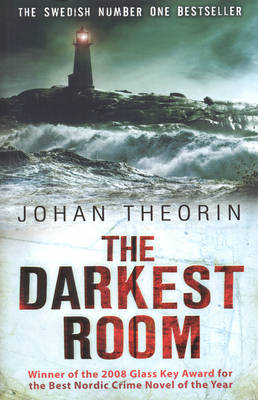
EURO CRIME
Reviews

Theorin, Johan - 'The Darkest Room' (translated by Marlaine Delargy)
Trade Paperback: 400 pages (July 2009) Publisher: Doubleday ISBN: 038561392X
THE DARKEST ROOM is a wonderful book, framed as the story of a wooden house, Eel Point, on the coast of the small island of Oland, Sweden - an island where the population is small and the old traditions continue. The house has a long, tragic history associated with the building of the two lighthouses on the nearby rocks, shipwrecks and various residents. The brief stories of these old tragedies are told in short sections interleaving the book's chapters, showing how Eel Point has become regarded today as haunted. The reader is never sure whether the ghosts are real, or to what extent the house's sad, cruel past is influencing current events.
A family moves to Eel Point, ostensibly to start a new life away from the city and the pressures of work and commuting, but as we gradually realise, there is another reason for the move. Katrine and Joakim have been married for seven years and are a typically smug, professional modern couple - good jobs, two lovely young children, well-off, and spending their spare time renovating their homes, which has enabled them to gradually move up the property ladder to the extent that they can now afford to buy the enormous yet run-down manor at Eel Point. At first it is hard to like either adult in this self-satisfied couple, but we gradually see the cracks in their personalities as, little by little, their story is revealed, and they become more sympathetic. Some of the revelations are from Katrine's estranged mother, Mirja Rambe, an artist of some renown and a determined Bohemian, for whom truth is an elastic concept. Mirja and her mother, an even more renowned artist, lived at Eel Point for a time during Mirja's childhood, and their secret history is central to the mysteries of the present.
Another plotline involves a series of robberies on the island. Three bored young men regularly get high on drugs before stealing from and vandalising holiday houses whose owners are absent in their regular jobs on the mainland. The police are completely unsuccessful in solving the case until Tilda Davidsson, a new recruit arrives. Tilda is the connection between THE DARKEST ROOM and the first novel in this loose series, ECHOES FROM THE DEAD, as she is the granddaughter of old Gerlof Davidsson's brother Ragnar. Tilda is both determined to make her mark as a policewoman subject to patronising sexism from her male colleagues (and smarting from an unfortunate affair), and also is interested in her own family history, of which she knows only fragments. Her grandfather Ragnar is dead, so she visits Gerlof in his old people's home to tape-record his reminiscences of his brother and their lives on the island. These sections of the book are among my favourites, both in Gerlof's reactions to the tape recording project and the way in which he infiltrates himself into Tilda's investigations. He immediately provides her with some good leads to the burglary case, as he knows old people who live near the properties concerned, people to whom a car passing down the road is a major life-event. Sure enough, Tilda and her colleagues soon begin to track down the perpetrators based on this evidence, and a case is gradually built up.
There are so many wonderful aspects to this book that it is impossible to note them all in a brief review. Above all, the author himself is a wonderful storyteller; one becomes totally immersed in his Oland world and in the lives and personalities of the superbly well-observed characters, major and minor. He is also a great plotter - the main stories as well as the minor ones weave in and out of each other: apparently small details in one story turn out to be highly relevant in another. He also has fun with the ghost-story concept, keeping the reader guessing as to whether he'll pull a supernatural solution out of the hat or whether he can possibly create a down-to-earth explanation for all the disparate events.
There is so much that could be said about this excellent novel, packed full of subtleties and stories, but my main advice is to read it and experience it for yourself. I wonder if, like me, you will be left thinking that there is more to the "solution" that the main protagonist, Joakim, realises? Does the author intend us to conclude that Joakim and Katrine have paid a price for a misdeed they themselves have done? I think so - for I believe that the couple has committed a terrible crime but are in total denial about it, and I believe that Johan Theorin wants us to see the novel as a story of acknowledgement and retribution.
A final note: I appreciated the translation by Marlaine Delargy: the collaboration between her and the author makes the book read as if it were written in the language in which I read it. THE DARKEST ROOM was a number one bestseller in Sweden and won the 2008 Glass Key award for the best Nordic crime novel of the year. If there is any justice in the world, the book will be winning many more awards now that it has been translated into English and so eligible for a greater number of them.
Maxine Clarke, England
August 2009
Details of the author's other books with links to reviews can be found on the Books page.
More European crime fiction reviews can be found on the Reviews page.